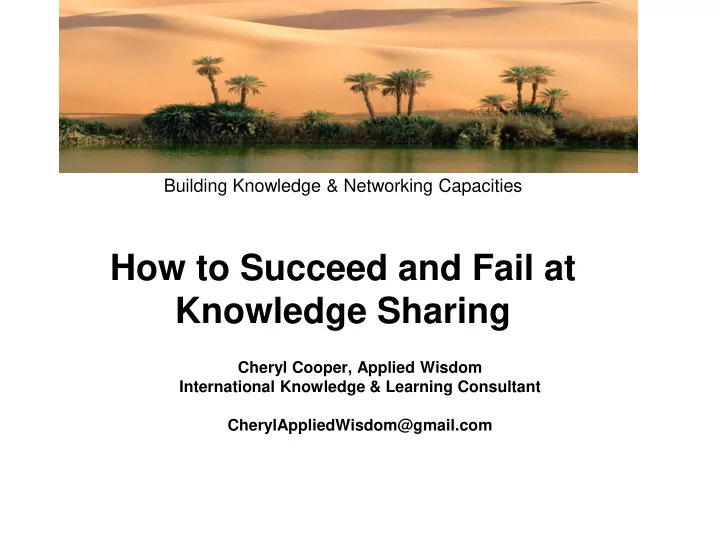

Building Knowledge & Networking Capacities How to Succeed and Fail at Knowledge Sharing Cheryl Cooper, Applied Wisdom International Knowledge & Learning Consultant CherylAppliedWisdom@gmail.com
Since 2002…... • Strategic Knowledge Management • Building Knowledge Sharing Capacity • Knowledge Retention & Transfer • British Council • Médecins sans Frontières • European Commission
Three Basic Rules of KNOWLEDGE SHARING 1. We always know more than we can say & we say more than we can write down 2. We only know what we know, when we need to know it 3. Knowledge can only be volunteered not conscripted
PERSONAL KNOWLEDGE MANAGEMENT
SUCCESS FACTORS 1. FOCUS – Strategic Direction – Improved Decision Making – New or Stronger Skills – Innovation
SUCCESS FACTORS 2. CREATE & IMPLEMENT A STRATEGY: – Identify Key Strategic Knowledge Assets – Ensure Assets exist – Make Assets Visible & Accessible – Accelerate organisational learning via • Quick “Safe to Fail” experiments • Small adjustments & reiterations
Strategic Knowledge Types British Council ONLY 5 for the whole organisation 1. Know the British Council (priorities, policies, standards) 2. Know our C ustomers (relationship, market research & market intelligence) 3. Know our P roducts & Services (what we offer, ideas & achievements) 4. Know WHY (and why not) (Good Practice & Lessons Learnt) 5. Know WHO (internal & external experts; the experienced)
SUCCESS FACTORS 3. Educate on Lessons Learned / Review & Reflect TECHNIQUES at every level 4. Support, strengthen and increase VISIBILITY of existing Knowledge Networks (& Communities)
Informal vs Formal Networks DG Director A Director B Director C
Finding the “Natural Talents & Enthusiasts” – the informal network where things get done
SUCCESS FACTORS “TPQs” THE PERSISTENT QUESTIONS: 1. What did we LEARN? 2. Who will CAPTURE it? 3. Where & How will we SHARE it?
FAILURE FACTORS • Focus only on Tools & Technology • Focus only on Information Gathering • Short-term project thinking rather than “new way of working” • Managers not modelling effective knowledge sharing • Making Knowledge Sharing mandatory
Lessons Learned: Success from Failure Doctors Without Borders (MSF) • Ebola crisis in West Africa • Urgent need for knowledge transfer • Infrastructure failure • App development for Field Officers • Chatham House Prize 2015
Lessons Learned : Fail? NASA Capabilities • 20 July 1969 to 2010 • 8 years • 5% Federal Budget • Project “Constellation” 2020 • 1% Federal Budget • $35 billion = only 2 rockets
FAILURE FACTORS • Focus only on Tools & Technology • Focus only on Information Gathering • Short- term project thinking not “new way of working” • Managers not modelling effective knowledge sharing • Making it mandatory
“Desire Path” (or “Social Trail”)
IN CONCLUSION Building Knowledge & Networking Capacity: – Evolutionary not Revolutionary – A Critical Success Factor in Managing Change – Strengthens Organisational Resilience
MANY PATHS TO KNOWLEDGE
CHERYL COOPER cherylappliedwisdom@gmail.com
Recommend
More recommend